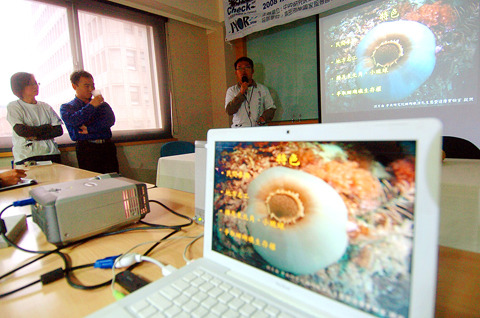A disease spreading quickly through coral reefs near Taiwan’s outlying islands poses a serious threat to the nation’s marine environment, experts and environmentalists said yesterday.
The International Year of the Reef last year called on people from 157 countries in the world to sign an online petition pledging to protect coral reefs. Each person who signed the petition pledged to behave in an environmentally responsible way — such as by using products that would not pollute the sea and eating only seafood that is caught in a sustainable manner.
Taiwan ranked fourth in the number of people who have taken the pledge, after the US, Malaysia and China.

PHOTO: LO PEI-DER, TAIPEI TIMES
“If calculated in proportion to the total population and surface area covered by coral reefs, Taiwan would actually be the champion,” said Allen Chen (陳昭倫), assistant research fellow at Academia Sinica’s Biodiversity Research Center. “This shows that Taiwanese care a lot about the preservation of coral reefs.”
Chen was one of the leaders of last year’s reef check project. Funded by Academia Sinica and other preservation organizations, 2008 Reef Check in Taiwan gathered volunteers from local Aboriginal tribes and diving groups to check the condition of coral reefs around the nation’s offshore islands.
What the volunteer divers and researchers discovered astounded them. While coral reefs were still relatively unaffected in the areas off Taitung (台東) and Penghu (澎湖), human activities were threatening their future.
“When we dived down and saw [the coral], we couldn’t believe that such a sight would exist in Taiwan. We thought, this is Taiwan’s ‘last remaining heaven,’” Chen said.
However, human activity such as development and construction, combined with over-fishing, threatens to destroy the coral reefs and endanger marine life, he said.
The researchers also found that a “black disease” was spreading quickly, covering reefs with a black disease and causing the reef coverage rate to drop in areas with more frequent human activity, such as Green Island (綠島) and Orchid Island (蘭嶼).
The discovery of a problem long suspected but seldom documented showed that coral was suffering widely in waters up to 5m deep and 300m offshore, Chen said.
“We still have to do more research to determine where the black disease comes from — is it caused by over-fishing or pollution?” Chen said.
Chen also expressed concern that in all the coastal areas they investigated, there was a serious deficiency of the types of fish that indicate the overall health of marine life. Over-fishing is caused by Taiwanese having a rich “seafood culture,” but lacking knowledge about marine preservation, he said.
Chen and other environmentalists urged the government to view coral reefs as living organisms, not rocks.
“Coral reefs are even more important than pandas because they are the largest living organism in the ocean,” Chen said, urging the government to pass laws to protect the reefs in order to ensure a rich and diverse marine ecology.
The environmental groups will be conducting another round of reef checks this year and encourage those who are interested in protecting marine life to sign up to volunteer at http://e-info.org.tw/node/40662 .
ADDITIONAL REPORTING BY AGENCIES

Alain Robert, known as the "French Spider-Man," praised Alex Honnold as exceptionally well-prepared after the US climber completed a free solo ascent of Taipei 101 yesterday. Robert said Honnold's ascent of the 508m-tall skyscraper in just more than one-and-a-half hours without using safety ropes or equipment was a remarkable achievement. "This is my life," he said in an interview conducted in French, adding that he liked the feeling of being "on the edge of danger." The 63-year-old Frenchman climbed Taipei 101 using ropes in December 2004, taking about four hours to reach the top. On a one-to-10 scale of difficulty, Robert said Taipei 101

Nipah virus infection is to be officially listed as a category 5 notifiable infectious disease in Taiwan in March, while clinical treatment guidelines are being formulated, the Centers for Disease Control (CDC) said yesterday. With Nipah infections being reported in other countries and considering its relatively high fatality rate, the centers on Jan. 16 announced that it would be listed as a notifiable infectious disease to bolster the nation’s systematic early warning system and increase public awareness, the CDC said. Bangladesh reported four fatal cases last year in separate districts, with three linked to raw date palm sap consumption, CDC Epidemic Intelligence

Taiwanese and US defense groups are collaborating to introduce deployable, semi-autonomous manufacturing systems for drones and components in a boost to the nation’s supply chain resilience. Taiwan’s G-Tech Optroelectronics Corp subsidiary GTOC and the US’ Aerkomm Inc on Friday announced an agreement with fellow US-based Firestorm Lab to adopt the latter’s xCell, a technology featuring 3D printers fitted in 6.1m container units. The systems enable aerial platforms and parts to be produced in high volumes from dispersed nodes capable of rapid redeployment, to minimize the risk of enemy strikes and to meet field requirements, they said. Firestorm chief technology officer Ian Muceus said

MORE FALL: An investigation into one of Xi’s key cronies, part of a broader ‘anti-corruption’ drive, indicates that he might have a deep distrust in the military, an expert said China’s latest military purge underscores systemic risks in its shift from collective leadership to sole rule under Chinese President Xi Jinping (習近平), and could disrupt its chain of command and military capabilities, a national security official said yesterday. If decisionmaking within the Chinese Communist Party has become “irrational” under one-man rule, the Taiwan Strait and the regional situation must be approached with extreme caution, given unforeseen risks, they added. The anonymous official made the remarks as China’s Central Military Commission Vice Chairman Zhang Youxia (張又俠) and Joint Staff Department Chief of Staff Liu Zhenli (劉振立) were reportedly being investigated for suspected “serious